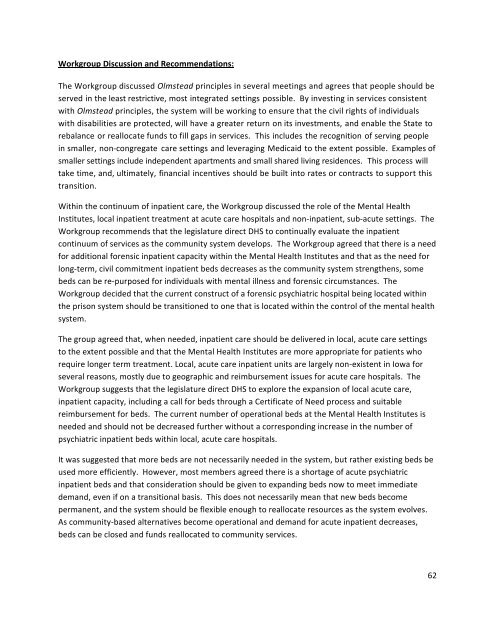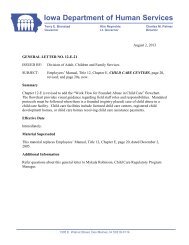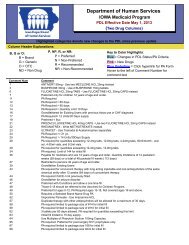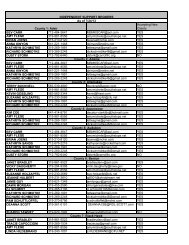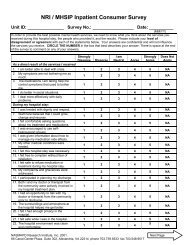Iowa Mental Health and Disability Services System Redesign Interim ...
Iowa Mental Health and Disability Services System Redesign Interim ...
Iowa Mental Health and Disability Services System Redesign Interim ...
- No tags were found...
You also want an ePaper? Increase the reach of your titles
YUMPU automatically turns print PDFs into web optimized ePapers that Google loves.
Workgroup Discussion <strong>and</strong> Recommendations:<br />
The Workgroup discussed Olmstead principles in several meetings <strong>and</strong> agrees that people should be<br />
served in the least restrictive, most integrated settings possible. By investing in services consistent<br />
with Olmstead principles, the system will be working to ensure that the civil rights of individuals<br />
with disabilities are protected, will have a greater return on its investments, <strong>and</strong> enable the State to<br />
rebalance or reallocate funds to fill gaps in services. This includes the recognition of serving people<br />
in smaller, non-congregate care settings <strong>and</strong> leveraging Medicaid to the extent possible. Examples of<br />
smaller settings include independent apartments <strong>and</strong> small shared living residences. This process will<br />
take time, <strong>and</strong>, ultimately, financial incentives should be built into rates or contracts to support this<br />
transition.<br />
Within the continuum of inpatient care, the Workgroup discussed the role of the <strong>Mental</strong> <strong>Health</strong><br />
Institutes, local inpatient treatment at acute care hospitals <strong>and</strong> non-inpatient, sub-acute settings. The<br />
Workgroup recommends that the legislature direct DHS to continually evaluate the inpatient<br />
continuum of services as the community system develops. The Workgroup agreed that there is a need<br />
for additional forensic inpatient capacity within the <strong>Mental</strong> <strong>Health</strong> Institutes <strong>and</strong> that as the need for<br />
long-term, civil commitment inpatient beds decreases as the community system strengthens, some<br />
beds can be re-purposed for individuals with mental illness <strong>and</strong> forensic circumstances. The<br />
Workgroup decided that the current construct of a forensic psychiatric hospital being located within<br />
the prison system should be transitioned to one that is located within the control of the mental health<br />
system.<br />
The group agreed that, when needed, inpatient care should be delivered in local, acute care settings<br />
to the extent possible <strong>and</strong> that the <strong>Mental</strong> <strong>Health</strong> Institutes are more appropriate for patients who<br />
require longer term treatment. Local, acute care inpatient units are largely non-existent in <strong>Iowa</strong> for<br />
several reasons, mostly due to geographic <strong>and</strong> reimbursement issues for acute care hospitals. The<br />
Workgroup suggests that the legislature direct DHS to explore the expansion of local acute care,<br />
inpatient capacity, including a call for beds through a Certificate of Need process <strong>and</strong> suitable<br />
reimbursement for beds. The current number of operational beds at the <strong>Mental</strong> <strong>Health</strong> Institutes is<br />
needed <strong>and</strong> should not be decreased further without a corresponding increase in the number of<br />
psychiatric inpatient beds within local, acute care hospitals.<br />
It was suggested that more beds are not necessarily needed in the system, but rather existing beds be<br />
used more efficiently. However, most members agreed there is a shortage of acute psychiatric<br />
inpatient beds <strong>and</strong> that consideration should be given to exp<strong>and</strong>ing beds now to meet immediate<br />
dem<strong>and</strong>, even if on a transitional basis. This does not necessarily mean that new beds become<br />
permanent, <strong>and</strong> the system should be flexible enough to reallocate resources as the system evolves.<br />
As community-based alternatives become operational <strong>and</strong> dem<strong>and</strong> for acute inpatient decreases,<br />
beds can be closed <strong>and</strong> funds reallocated to community services.<br />
62


